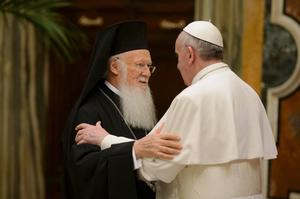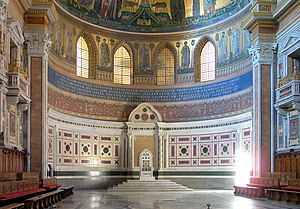The Pope met today with Orthodox leaders, Byzantine and Oriental Orthodox, the Anglicans, other ecclesial communities and leaders of various other religions. Of particular interest is the personal meeting of Francis and Bartholomew; the Pope also met with Metropolitan Hilarion of the Russian Orthodox Church.
Rome Reports has a review of this important ecumenical meeting.

First of all, heartfelt thanks for what my Brother Andrew told us. Thank you so much! Thank you so much!
It is a source of particular joy to meet you today, delegates of the Orthodox Churches, the Oriental Orthodox Churches and Ecclesial Communities of the West. Thank you for wanting to take part in the celebration that marked the beginning of my ministry as Bishop of Rome and Successor of Peter.
Yesterday morning, during the Mass, through you , I recognized the communities you represent. In this manifestation of faith, I had the feeling of taking part in an even more urgent fashion the prayer for the unity of all believers in Christ, and together to see somehow prefigured the full realization of full unity which depends on God's plan and on our own loyal collaboration.



